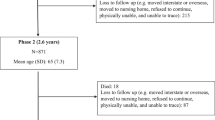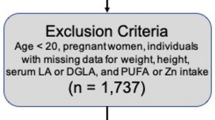Abstract
Objectives: Little information is available about the intake of very-long-chain n-3 fatty acids in random samples of populations. We examined if the intake of these fatty acids was associated with gender, social status and lifestyle in a similar way as other indicators for a healthy diet in a nationwide survey.
Design and subjects: Data were obtained from self-administered quantitative food frequency questionnaires filled in by a representative sample of Norwegian men and women, aged 16–79 y. 3144 (63%) of the invited subjects responded with acceptable questionnaires.
Results: Daily intake of very-long-chain n-3 fatty acids was on average 0.9 g/d and 0.4% of total energy was derived from these fatty acids. Energy derived from very-long-chain n-3 fatty acids was slightly higher among men than women, and two-fold higher among subjects aged 60–79 vs 16–29 y. White collar workers had higher intake of very-long-chain n-3 fatty acids than blue collar workers. Men and women in the highest quartile of intake of very-long-chain n-3 fatty acids had 2–3 E% higher fat intake (mostly mono- and polyunsaturated fatty acids), as compared to individuals in the lowest quartile. They also had 3–4 fold higher daily intake of retinol and vitamin D, as well as 20–50% higher intake of fruits and vegetables, dietary fibre and vitamin C.
Conclusions: Intake of very-long-chain n-3 fatty acids was correlated to indicators for healthy dietary habits. However, contrary to many other indicators of a healthy diet, energy derived from very-long-chain n-3 fatty acids was not significantly associated with female gender or non-smoking.
Sponsorship: Ministry for Health and Social Affairs, Ministry for Agriculture and Norwegian Research Council.
This is a preview of subscription content, access via your institution
Access options
Subscribe to this journal
Receive 12 print issues and online access
$259.00 per year
only $21.58 per issue
Buy this article
- Purchase on Springer Link
- Instant access to full article PDF
Prices may be subject to local taxes which are calculated during checkout
Similar content being viewed by others
Author information
Authors and Affiliations
Rights and permissions
About this article
Cite this article
Johansson, L., Solvoll, K., Bjørneboe, GE. et al. Intake of very-long-chain n-3 fatty acids related to social status and lifestyle. Eur J Clin Nutr 52, 716–721 (1998). https://doi.org/10.1038/sj.ejcn.1600632
Received:
Revised:
Accepted:
Published:
Issue Date:
DOI: https://doi.org/10.1038/sj.ejcn.1600632
Keywords
This article is cited by
-
Regular consumption of cod liver oil is associated with reduced basal and exercise-induced C-reactive protein levels; a prospective observational trial
Journal of the International Society of Sports Nutrition (2021)
-
Intake of arachidonic acid-containing lipids in adult humans: dietary surveys and clinical trials
Lipids in Health and Disease (2019)
-
The Influence of n‐3 PUFA Supplements and n‐3 PUFA Enriched Foods on the n‐3 LC PUFA Intake of Flemish Women
Lipids (2010)
-
Omega-3 fatty acids and multiple sclerosis: relationship to depression
Journal of Behavioral Medicine (2008)
-
Fish Consumption Among Pregnant Women in London, Ontario
Canadian Journal of Public Health (2007)



